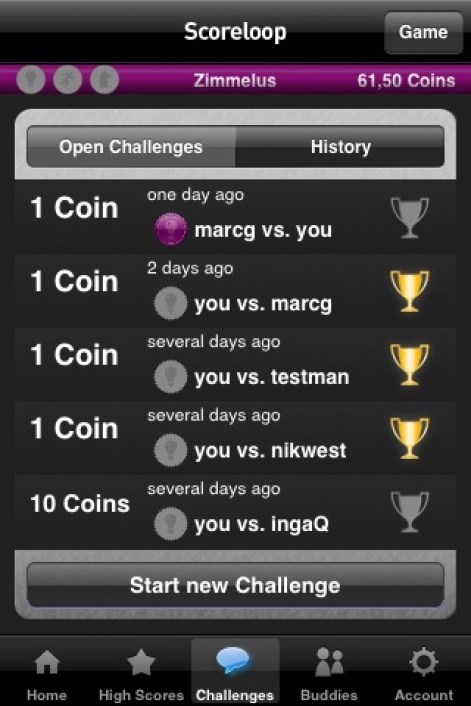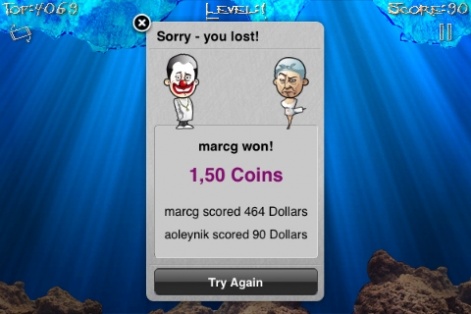There's Aurora Feint's OpenFeint, for example, AGON Online, console/PC platform GameSpy, Geocade, and ngmoco's newly-announced Plus+ network. And you can add to that number German firm Scoreloop, too.
We chatted to CEO Marc Gumpinger to find out more.
"As of today we have 100+ registered developers who have downloaded the SDK, and several games live on the App Store," he says. "But there are a tremendous number of games in the pipeline from developers that have committed themselves."
Those games include Zombie Pub Crawl, Aeio and Submarine, all from independent developers. So how is the company appealing to developers, who have plenty of choice when it comes to connected platforms?
"Our USP is challenges," says Gumpinger. "We allow games to be challengable against other people, and it's what sets us apart from the companies just offering high scores and chat. Challenges are what interconnect people, and it's establishing a new category of gaming: mobile social gaming."
One challenge for Scoreloop itself is that its rivals have caught on fast. OpenFeint maker Aurora Feint announced new features this morning allowing developers to use push notifications for challenges, while challenges are likely to be part of ngmoco's Plus+ too.

Still, Scoreloop's technology is flexible, offering a choice of asynchronous or real-time challenges for games.
It also ties into Facebook to match up real-life friends, and offers sophisticated skill-matching for strangers, as well as location-based high score tables. Advertising isn't included, which Gumpinger says is a plus point for gamers.
However, the company's real USP may be its use of virtual coins, which players gamble against one another in these challenges.
"There are different ways of getting these coins," says Gumpinger. "You get them for downloading games, inviting friends, and you can also get them for winning. And you can also buy coins, which is the business model behind this."
Scoreloop actually offers its platform to developers for free because of this: its plan is to make money by sharing the revenues from players buying these virtual coins.
Is this a sustainable model? How do you walk the line between giving out so many free coins through the actions above that players don't ever feel the need to buy more, and annoying players by forcing them to cough up to play games they've already paid for?
"It's a balancing act," says Gumpinger. "We take a very balanced approach to how many coins we give out, with the aim of slowly bringing players to the idea of buying these coins. We've seen this model works very well on the Web, and we think it fits very well with our challenges."
One important point is that players can't 'cash out' - exchange the coins they've won for real cash. That would make Scoreloop-enabled games proper gambling, with serious implications in those countries (i.e. the US) where remote gambling is illegal.
However, intriguingly, as legislation changes, so the platform may evolve.
"We're definitely thinking about it," says Gumpinger. "We have a lot of legal expertise in this area, so it's something we're keeping in mind. The nice thing is that if things change, we can do it very quickly."

Besides those 100+ indie developers (many of whom, it should be said, may be also evaluating rival platforms), Scoreloop is also talking to larger publishers and big brands about using its platform for iPhone.
Couldn't Apple blow all these connected platforms out of the water if it decides to do a Microsoft and mandate its own Xbox Live style community, though?
"Apple? At the end of the day it's pretty hard to predict what Apple is doing!" says Gumpinger. "All I can say is there's a need for these things, so we couldn't sleep at night if we weren't doing it."
Who knows: perhaps if Apple did decide to launch an iPhone gaming community, it may look to acquire one of the platform companies, as it has done in other areas of its business in the past.
Interestingly, though, Scoreloop isn't confining its ambitions to iPhone gaming. "iPhone is right now the most developed market, but we already have prototypes for Android and Java running internally," says Gumpinger.
"But we have to say, we are really happy with Apple's new [iPhone 3.0] features, and we have the knowhow and ambition to truly support iPhone, rather than making it the lowest common denominator."
Scoreloop's technology is certainly slick, judging by its implementation in its first three games. But with rivals adding new features to their platforms fast, it can't afford to stand still in the coming months.
If challenges do become a standard feature across the board, how does Scoreloop move forward? "We will be announcing something surprising that gamers will be very happy about in the near future," says Gumpinger.
"Something that you might not have expected. It's not a big secret that it's hard to find games in the App Store. Well, that problem maybe gives you a peek at what we're doing..."
One to watch, for sure. PocketGamer.biz will soon be taking a more detailed comparative look at the various connected iPhone gaming platforms.





















